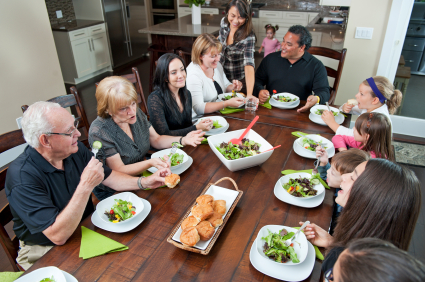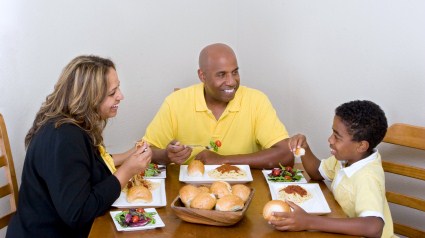Dinner conversation is the richest, most powerful language experience of your child’s life. Just for starters, researchers have found that talking to children during dinner is even better than reading to them as a way to boost their vocabulary. Even more importantly, the stories told around the table may be the best way to build a sense of resilience and foster optimism in your children.

Dinner table conversation has special qualities that make it different from talk we have at other times such as while carpooling or while tucking kids in at bedtime. Research indicates that, on average, children bring up about six different topics at dinner, so conversation tends to be interesting and varied. Also, families who eat together expect that children will sit and talk for more than a few minutes and each topic usually gets input from several members, so there are multiple viewpoints expressed. This exposure to multiple points of view engages kids in complex thinking and can encourage tolerance for opinions different from one’s own.
Focusing on certain types of conversations, particularly narrative conversation, or the telling of stories, can be particularly helpful. Helping kids tell stories that include their thoughts and feelings rather than just the facts is associated with greater well being. Research shows that children who know a lot about their parents’ own childhood and family histories will become more resilient – the capacity to bounce back from the slings and arrows that life throws at each of us and better able to learn from adversity, continuing to face ourselves and each other with optimism. Who doesn’t want that for their children? Many researchers have also found that children who learn a lot about their families had higher self-esteem and see themselves rather than others as responsible for their own behavior.

So how can we promote these vital conversations? First, parents can focus on particular content that extends children’s knowledge of their parents, their grandparents and their cultural ancestry. Some questions to ask at the table include:
- “Do you know the story about how your parents met?”
- “Do you know how your name was chosen, or how your parents’ names were chosen?
- “Do you know some of the lessons that your parents learned from good or bad experiences they had during their childhood?”
- “Do you know some of the jobs that your parents had when they were young?”
- What is the earliest story you know about an ancestor?
Secondly, parents may piggyback on a story told by a child, in order to tell one with a similar theme. For example, if a teen tells a story about not getting a part in a play, a parent may want to tell a story about a setback he faced and what he learned from it. Stories that start out with something negative but end up positively are associated with greater feelings of life satisfaction.
As a family therapist, the conversations I try to promote in my office are just the kind that can naturally occur around the dinner table. In therapy and at the table, each family member is encouraged to speak about his or her own experience while being listened to with curiosity and respect. Children and their parents come away from both experiences with the sense that the family is more than the sum of its individual parts: Instead, what is created is something greater — the sense of belonging to a family that has its own set of stories and identities.
Sources:
https://www.marial.emory.edu/pdfs/Duke_Fivush027-03.pdf
Snow, C., & Beals, D. (2006). Mealtime talk that supports literacy development. In Larson, R., Wiley, A., & Branscomb, K. (Eds.), Family mealtime as a context of development and socialization (pp. 1-15). San Francisco, CA: Wiley Periodicals, Inc.

 Anne Fishel is an Associate Clinical Professor of Psychology at the Harvard Medical School and the Director of the Family and Couples Therapy Program at Massachusetts General Hospital. She has lectured and written about the benefits of family meals.
Anne Fishel is an Associate Clinical Professor of Psychology at the Harvard Medical School and the Director of the Family and Couples Therapy Program at Massachusetts General Hospital. She has lectured and written about the benefits of family meals.